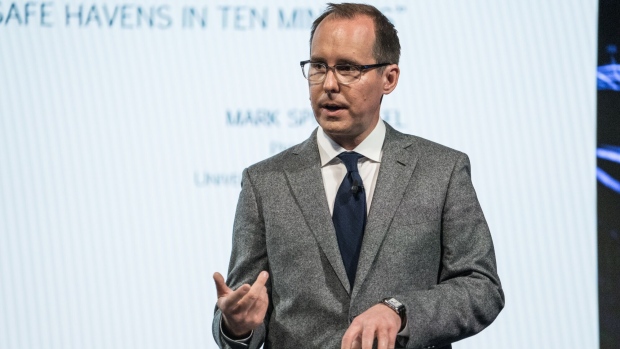Nov 9, 2023
Black Swan Fund Manager Says Start Worrying When Fed Cuts Rates
, Bloomberg News

(Bloomberg) -- Mark Spitznagel, the Universa Investments founder and chief investment officer whose firm is advised by Black Swan author Nassim Nicholas Taleb, said the stock market is likely to surge — then turn drastically when the Federal Reserve starts cutting interest rates.
“That’s when things are going to get really awful,” Spitznagel said in an interview this week in New York.
Spitznagel is extending his concerns about the market’s reliance on Fed support through more than a decade of low interest rates and its bond-buying program, which it’s now in the process of trying to reverse. Earlier this year, he told investors we’re living in “the greatest tinderbox-timebomb in financial history,” even worse than the late 1920s run-up to the Great Depression.
“This is my own crazy theory: I think our rates are going to go back to zero as well. I mean, a lot of people would think I’m nuts,” said Spitznagel, 52. “But remember when a credit bubble pops, remember what a deflationary event that is. It’s like taking a giant pile of cash and lighting it on fire.”
Universa, based in Miami, is a tail-risk fund, which means it’s designed to protect investors when markets turn south. Tail-fund managers are inclined to warn against the next blowup, touting their strategies to clients as an insurance policy against extreme moves in financial markets. Spitznagel’s greatest payouts to investors come during extreme market crashes, such as the pandemic-spurred one in March 2020.
He said this week that he believes the Fed will have a hard time with its quantitative-tightening efforts, and that the central bank may even have to start easing once again.
“I think they’re gonna have to come back with vengeance, I really do,” he said.
The Fed’s balance sheet, which had roughly $9 trillion in assets at its peak in 2022, has declined to less than $7.9 trillion. That’s still some $3.7 trillion more than where they stood at the beginning of 2020, before the Covid-19 pandemic spurred the central bank to support markets even more drastically.
Spitznagel said he believes the Fed will need to reaffirm its support because he sees a recession as likely. Yet the market will continue to rise before tumbling because “the Fed just paused — that’s a good start right there — and people are positioned in a way like we’re about to crash,” he said.
“We’re probably deferring a recession to next year, and the yield curve has spent some time being uninverted,” Spitznagel said. “Put all those things together and we’re going vertical. But the sentiment is very, very negative.”
The S&P 500 has been on a week-and-a-half rally, held up in particular by dovish signals of late from Federal Reserve policymakers. While borrowing costs in the US have risen to a 22-year high, yields have begun to subside recently.
Spitznagel said the lagged effects of such high rates have yet to be fully realized throughout the economy, and future cuts will reflect the inability of borrowers to stomach higher borrowing costs after saddling themselves with debt.
“We’re likely now in a brief Goldilocks zone, and no one expects it — more squeeze-up and blow-off in risk assets, which I’ve been writing and saying for a year,” he said. “Then Papa Bear shows up, and it will be too late to react.”
©2023 Bloomberg L.P.






